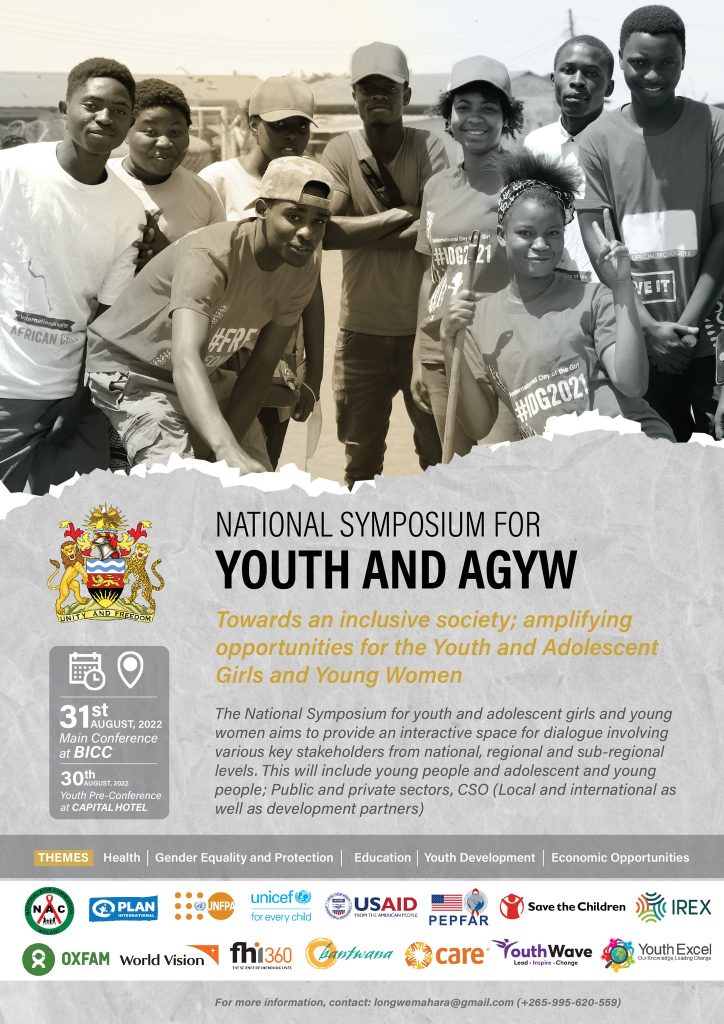The Abstract was presented at the National Symposium for Youth and AGYW at BICC, Lilongwe on 31 August 2022.
Authors: John Kumwenda1, Ruth Kundecha1, Lawrence Mpende1, Nennie Lungu2, Boniface Maket2 Maria Mkandawire2
1 CHAM, Malawi EMPOWER
2 FHI360, Malawi EMPOWER
Introduction
Pre-Exposure Prophylaxis (PrEP), a drug taken to prevent HIV, is a safe and effective prevention option for all populations at substantial risk of HIV acquisition when taken as prescribed. Malawi EMPOWER offers PrEP to adolescent girls and young women (AGYW) in DREAMS clubs in Zomba and Machinga as part of its comprehensive package of services. This abstract aims to assess barriers to PrEP uptake by adolescent girls and young women(AGYW) in Machinga.

Methodology
The study design was cross-sectional and employed qualitative approaches, namely focus group discussions and key informant interviews. A simple random sampling technique was deployed to select facilities from which data was collected. In total, three health facilities were selected, and three focus group discussions were conducted involving AGYW 15 to 24 years eligible for PrEP. In total 30 AGYW were interviewed. A total of six key informants being Dreams’ club facilitators were interviewed. Thematic analysis was used.
Study findings
The study findings showed that, the general understanding of PrEP was that ‘PrEP is offered to individuals, particularly girls who are HIV negative to prevent them from contracting HIV’. Furthermore, on barriers to accessing PrEP under social/community challenges, results revealed that AGYWs are usually mocked by their friends, other health users, and their families by saying ‘they are taking ARVs though not sick and even calling them names in vernacular’ insinuating that ‘‘they indulge in high risk sex hence the need to take ARVs.’ On economic and strategic challenges, the results showed that girls are affected by long distances and long travel hours to PrEP service delivery sites including long queues in facilities. Regarding health challenges, AGYW on PrEP experience nausea and stomach pains after taking PrEP, especially in the first days of taking the drug.
Conclusion
Long distances to PrEP delivery sites and social/community myths are the major drawbacks for the PrEP intake by Adolescent Girls and Young Women in the Machinga district. This would also affect the sustainability of the PrEP initiative.
Recommendations for PrEP Initiative
The study recommended conducting community dialogues and sensitization meetings with parents and or guardians of the AGYW to demystify the negative perceptions upheld by the community. In addition, taking PrEP closer to AGYWs by utilizing existing forums where girls meet such as clubs to curb the long distance and queues barrier.
FHI-360 - Malawi EMPOWER
Bluegum Avenue, Mulima Building,
P.O. Box 521
Zomba
Malawi
Phone: +265 887 827 291
E-mail:BMaket@fhi360.org
Website: www.malawiempower.org
